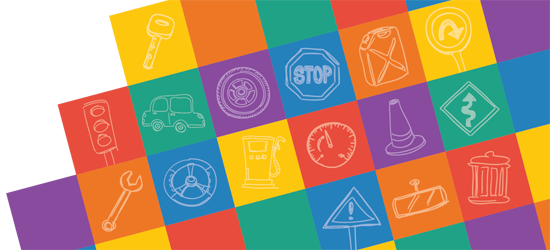
Driving tips and other life stuff
How to beat your first winter on the road
If you passed your driving test in lovely June and happily set about learning the ropes in bright sunshine, light showers and long days...winter may be a bit of a scary prospect.
I was terrified of my first winter as a driver because of the dark and the bad weather, so here are some things I hope will help you build your confidence.
5 tips for winter driving
-
Look for clues in the dark
-
Keep your windscreen squeaky clean
You've never known true fear until you've had someone coming at you with main beams on and your windscreen goes opaque as the light hits the smears. Trust me, it's bloody scary.
By the time it's dark in the afternoons, that's too late. Try to keep on top of cleaning your windscreen so this doesn't happen but keep cleaning stuff in your car too, so you can pull over and sort yourself out is you need to.
See also: making sure your demister works!
-
Check your fog lights
You do not want your first experience of fog to involve scrabbling around for your fog lights.
Try them out before your next drive so you're happy you know how to turn them on and off without looking, then have a walk around your car so you know what other drivers see.
You should use fog lights when you can't see further than 100 metres (Usain Bolt's speciality) but in the real world, you'll know when you need them because it's foggy as hell.
Find out the rules about using your fog lights.
Fog lights don't so much help YOU see as other people see you. And if it's foggy enough to need them, it's foggy enough that you need to slow right down. Keep your full beams off because they won't help you see further - they might even make it worse.
-
Get your winter equipment prepped
- Ice scraper - at the very least
- De-icer
- A cloth for wiping the inside of your windscreen
-
Get enough sleep
The first time you drive home after work or college in the dark, it will honestly feel like an impossible task. Do other drivers have night vision or something?!
Find the white line that means the edge of the road. Your lights will illuminate it and you can keep yourself on course with that. This is where throwing your observation as far as you can comes in REAL handy; you need to keep that white line in your sights right up ahead so you know when a bend or junction is coming up. Put your eyes on full beam.
If you're on a rural road with no clear lines, look for clues like your lights hitting trees or a kerb. Still scary? Slow down.
Hopefully you've also got used to switching between full and dipped beams, so use full if you're struggling to see. Make sure you dip them when a car comes the other way and don't have them on full if you're quite close to the car ahead.
It's a good idea to get practice with night driving before you take your test but you can just as easily practise after you pass. Take a trusty buddy and take it slow.
Get the full guide to when and how to use your car lights.
Every year, millions of drivers around the country are surprised by the first frost. Yep, people who passed their test many years ago, trying to get through an inch of ice with their Tesco Clubcard and cursing loudly.
The trouble with not being prepared for that first frost is that if you deal with it properly, you're going to be late. If you don't deal with it properly, you're going to be driving without full visibility and with every chance of getting pulled over.
Always de-ice your windscreen and rear window COMPLETELY, demist your windscreen, and make sure your wing mirrors are clear as well. Winter driving = an extra 5 minutes on your journey time to make sure you're safe.
What you need BEFORE winter hits:
Check out what else you need in your car kit for emergencies.
When you get up in the dark and come home in the dark, it feels like you're living in a land of eternal night.
Humans work best with plenty of light and in the winter, we just don't get enough. It's a load of science to do with vitamin D and melatonin and blah blah but in short: winter is not good for us.
Driving tired is a seriously dangerous thing to do - some experts claim more dangerous than driving over the drink drive limit because your concentration is lower, your motor skills are affected and you're at risk of microsleeping, which can mean you're covering metres of road with no one at the wheel, essentially.
To deal with the dark, early mornings, you need to try to force yourself to sleep earlier. Put your phone out of reach, turn off the TV. Whatever it takes to maximise your rest time. You'll do better in other areas of your life as well, and you'll be healthier.
Updated: 22 Jan 2020You need to adjust your driving to the road conditions. Find out more about driving in icy weather.
By Katey Gregory
Katey Joined ingenie in 2014 and is in charge of all things social and content. She passed her driving test in 2015 and her first car is a Toyota Yaris T3 named Tyrone.












